Potential Hazards Associated with Wearing of Synthetic Hairs (Wigs, Weavons, Hair Extensions/Attachements) In Nigeria
Article Information
Dike Ijere, N. Okereke, J. N. and Ezeji, E. U.
1Department of Biotechnology, School of Biological Sciences; Federal University of Technology Owerri, Imo State, Nigeria.
*Corresponding Author: Nwanne Dike Ijere, School of Biological Sciences; Federal University of Technology Owerri, Imo State, Nigeria.
Received: 7 November 2022; Accepted: 14 November 2022; Published: 28 November 2022
Citation:
Dike Ijere, N., Okereke, J.N., and Ezeji, E.U. Potential Hazards Associated With Wearing of Synthetic Hairs (Wigs, Weavons, Hair Extensions/ Attachements) in Nigeria. Journal of Environmental Science and Public Health. 6 (2022): 299-313.
View / Download Pdf Share at FacebookAbstract
The female gender daily crave for new looks supposedly to boost selfconfidence and maintain elegance through the constant use of various synthetic hairs in the form of wigs, weavons and hair atttachments/ extensions of different sizes, colours and patterns without taking cognizance of the underlying harm of wearing such synthetic hairs. The potential hazards associated with wearing synthetic hairs by female folks in Nigeria was carried out using 10 different synthetic hairs obtained in different outlets. The presence and concentrations of some heavy metals such as cadmium, iron, silver, zinc, lead, chromium, manganese copper, nickel, tin and vanadium including high levels of acidity and nitrate in the synthetic hairs were determined using Atomic Absorption Spectrophotometer (AAS) according to the methods by APHA and FEPA. The Gas Chromatograph (GC) was used to determine the chemical substances (which were mostly Polychlorinated biphenyls) present in the synthetic hairs. It was observed that 4, 4-bipyridinium dichloride, cannabinoids, buprenorphine, emamectin, g-HCH and chlorpyrifos were highly significant in these synthetic hairs at different levels. The elevated levels of heavy metals and chemical substances found in these synthetic hairs shows a propensity to cause harm to the wearers/users. Thus, the need to consider the implications before buying and wearing of these hairs as chemical substances and heavy metals induce toxicity to human body even at low level.
Keywords
Synthetic hairs, wigs, weavons, hair attachments/extensions, heavy metals, polychlorinated biphenyls.
Synthetic hairs articles; wigs articles; weavons articles; hair attachments/extensions articles; heavy metals articles; polychlorinated biphenyls articles.
Synthetic hairs articles Synthetic hairs Research articles Synthetic hairs review articles Synthetic hairs PubMed articles Synthetic hairs PubMed Central articles Synthetic hairs 2023 articles Synthetic hairs 2024 articles Synthetic hairs Scopus articles Synthetic hairs impact factor journals Synthetic hairs Scopus journals Synthetic hairs PubMed journals Synthetic hairs medical journals Synthetic hairs free journals Synthetic hairs best journals Synthetic hairs top journals Synthetic hairs free medical journals Synthetic hairs famous journals Synthetic hairs Google Scholar indexed journals hydrocarbon articles hydrocarbon Research articles hydrocarbon review articles hydrocarbon PubMed articles hydrocarbon PubMed Central articles hydrocarbon 2023 articles hydrocarbon 2024 articles hydrocarbon Scopus articles hydrocarbon impact factor journals hydrocarbon Scopus journals hydrocarbon PubMed journals hydrocarbon medical journals hydrocarbon free journals hydrocarbon best journals hydrocarbon top journals hydrocarbon free medical journals hydrocarbon famous journals hydrocarbon Google Scholar indexed journals weavons articles weavons Research articles weavons review articles weavons PubMed articles weavons PubMed Central articles weavons 2023 articles weavons 2024 articles weavons Scopus articles weavons impact factor journals weavons Scopus journals weavons PubMed journals weavons medical journals weavons free journals weavons best journals weavons top journals weavons free medical journals weavons famous journals weavons Google Scholar indexed journals heavy metals articles heavy metals Research articles heavy metals review articles heavy metals PubMed articles heavy metals PubMed Central articles heavy metals 2023 articles heavy metals 2024 articles heavy metals Scopus articles heavy metals impact factor journals heavy metals Scopus journals heavy metals PubMed journals heavy metals medical journals heavy metals free journals heavy metals best journals heavy metals top journals heavy metals free medical journals heavy metals famous journals heavy metals Google Scholar indexed journals fluted pumpkin articles fluted pumpkin Research articles fluted pumpkin review articles fluted pumpkin PubMed articles fluted pumpkin PubMed Central articles fluted pumpkin 2023 articles fluted pumpkin 2024 articles fluted pumpkin Scopus articles fluted pumpkin impact factor journals fluted pumpkin Scopus journals fluted pumpkin PubMed journals fluted pumpkin medical journals fluted pumpkin free journals fluted pumpkin best journals fluted pumpkin top journals fluted pumpkin free medical journals fluted pumpkin famous journals fluted pumpkin Google Scholar indexed journals health articles health Research articles health review articles health PubMed articles health PubMed Central articles health 2023 articles health 2024 articles health Scopus articles health impact factor journals health Scopus journals health PubMed journals health medical journals health free journals health best journals health top journals health free medical journals health famous journals health Google Scholar indexed journals toxic articles toxic Research articles toxic review articles toxic PubMed articles toxic PubMed Central articles toxic 2023 articles toxic 2024 articles toxic Scopus articles toxic impact factor journals toxic Scopus journals toxic PubMed journals toxic medical journals toxic free journals toxic best journals toxic top journals toxic free medical journals toxic famous journals toxic Google Scholar indexed journals Vaccination articles Vaccination Research articles Vaccination review articles Vaccination PubMed articles Vaccination PubMed Central articles Vaccination 2023 articles Vaccination 2024 articles Vaccination Scopus articles Vaccination impact factor journals Vaccination Scopus journals Vaccination PubMed journals Vaccination medical journals Vaccination free journals Vaccination best journals Vaccination top journals Vaccination free medical journals Vaccination famous journals Vaccination Google Scholar indexed journals Bioaccumulation articles Bioaccumulation Research articles Bioaccumulation review articles Bioaccumulation PubMed articles Bioaccumulation PubMed Central articles Bioaccumulation 2023 articles Bioaccumulation 2024 articles Bioaccumulation Scopus articles Bioaccumulation impact factor journals Bioaccumulation Scopus journals Bioaccumulation PubMed journals Bioaccumulation medical journals Bioaccumulation free journals Bioaccumulation best journals Bioaccumulation top journals Bioaccumulation free medical journals Bioaccumulation famous journals Bioaccumulation Google Scholar indexed journals polyvinyl chloride articles polyvinyl chloride Research articles polyvinyl chloride review articles polyvinyl chloride PubMed articles polyvinyl chloride PubMed Central articles polyvinyl chloride 2023 articles polyvinyl chloride 2024 articles polyvinyl chloride Scopus articles polyvinyl chloride impact factor journals polyvinyl chloride Scopus journals polyvinyl chloride PubMed journals polyvinyl chloride medical journals polyvinyl chloride free journals polyvinyl chloride best journals polyvinyl chloride top journals polyvinyl chloride free medical journals polyvinyl chloride famous journals polyvinyl chloride Google Scholar indexed journals
Article Details
1. Introduction
Synthetic hairs are man-made fibres usually from polymers and plastics such as polyethylene terephthalate, polyvinyl chloride, acrylic, acrylonitrile, single filament polyester, silk, silicone and Kanekalon [16]. These fibres undergoes various chemical processes that make them have a synonymous look, feel, luster, colour, smoothness, and styling capability as human hair [38]. The highest quality of synthetic hair is the Kanekalon hair fibres which are heat -friendly, thus, works effectively with curling irons, blow dryers and hot-rollers. Synthetic hairs can be found in many vibrant colours such as pink, blue, green, and bright red, including natural tones (www.headcovers.com).
Generally, synthetic hairs are commonly used by women to make their hair appear longer, thicker, or a different colour. Synthetic hairs are worn in several ways. One way is by wearing a wig in which a person’s original hair is tucked in with the wig covering the top, back, and sides of the head. Another, is the weave which is often glued to the scalp with bonding glues or sewed into the hair with a thread. Synthetic hairs (hair extensions/attachments) are also commonly used for braiding. Synthetic hair extensions and wigs are usually ready-to-wear and are available in a range of textures (straight, wavy, and curly), colours and lengths (www.carolsdaughter.com). However, majority of women that use synthetic hairs usually experience itching, irritation and redness when the hair comes in contact with their skin; without taking notice of the insidious danger.
This study seeks to evaluate the potential impacts associated with the constant use/ wearing of synthetic hairs in order to maintain a healthy, supportive environment to women and female gender, and for ecosystem sustainability.
2. Materials and Methods
In line with APHA [2], the following physicochemical parameters were evaluated in the study, the acidity, chloride, nitrate, phosphate, sulphate, cadmium, zinc, chromium, manganese, aluminum, nickel, magnesium, sodium, silver, iron, mercury, copper, cobalt, molybdenum, tin and vanadium were determined using Atomic Absorption Spectrophotometer (Agilent Technologies 200 Series AA) where each parameter has its reagent kit for its estimation.
For the Gas Chromatograph analysis, ten different synthetic hairs were cut or shredded into pieces with scissors. They were kept in sample kits and labelled respectively according to their names. 10 g of each of the synthetic hair samples were soaked in 150 ml of n-Haxane for 24 hrs. They were heated for 10 mins and allowed to cool for 30 mins. 20 ml of each of the synthetic hair sample water were passed through a mixture of 1 g magnesium silicate and 0.5 g of sodium sulphate using Whatmann filter paper to extract oil, remove water and other impurities that may damage the GC column. The samples were taken for analysis using Gas Chromatograph according to the methods described by APHA [2].
3. Results
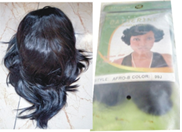
PLATE 1A & 1B: CATHERINE
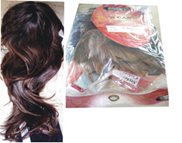
PLATE 2A & 2B: EYE CANDY
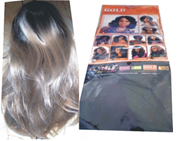
PLATE 3A & 3B: GOLD
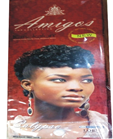
PLATE 4: CALYPSO
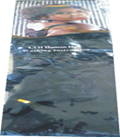
PLATE 5: LVH
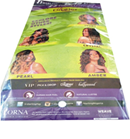
PLATE 6: DAZZLER
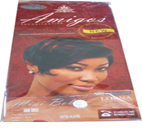
PLATE 7: MINI BOB
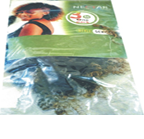
PLATE 8: NECTAR
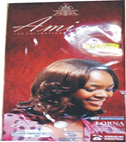
PLATE 9: DIANA
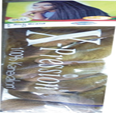
PLATE 10: X-PRESSION
PLATE 1A: This is a full-view pictorial representation of the synthetic hair (wig) Catherine used by hairdressers and their clients. Catherine is a 49 cm long, black, straight wig with body wave made in China by Luohe longteng hair CO-LTD. The style is designated Afro-B and the colour 99J. The weight is 95 g.
PLATE 1B: This is a packet-view of the synthetic hair Catherine.
PLATE 2A: This is a full view pictorial representation of the synthetic hair (wig) Eye Candy used by hairdressers and their clients. Eye Candy is a 48 cm long, wine-like brown colour S-waves wig made in New York, USA by Cleopatra Wig collection. The style is designated KK Bernice Wig and the colour 6. The weight is 90 g.PLATE 2B: This is a packet-view of the synthetic hair Eye Candy.
PLATE 3A: This is a full-view pictorial representation of the synthetic hair (wig) Gold used by hairdressers and their clients. Gold is a 64 cm long, golden, straight wig with more volume made in Indonesia by Donna Vonci Ltd. The style is designated classy deep and the colour 30/38; weight is 95g.
PLATE 3B: This is a packet-view of the synthetic hair Gold.
PLATE 4: This is a pictorial representation of the synthetic hair (weavon) Calypso used by hairdressers and their clients. Calypso is a 6 cm short, curly, black and brown weavon made in Nigeria by Lorna Nigeria Limited commonly known as the Amigos. The colour is 1 and the weight is 120 g.
PLATE 5: This is a pictorial representation of the synthetic hair (weavon) LVH used by hairdressers and their clients. LVH is a 10 cm short, black, spiral/curls weavon made in China by Rebecca Fashion Ltd. the style is designated 20331 SAVANAH and the colour 1. The weight is 85 g.
PLATE 6: This is a pictorial representation of the synthetic hair (weavon) Dazzler used by hairdressers and their clients. Dazzler is a 64 cm long, curly and wavy weavon made in Ghana by WEAVE Ghana Limited and marketed in Nigeria by Lorna Nigeria Limited. The style is designated CRYSTAL 16 and the Colour 1/27.
PLATE 7: This is a pictorial representation of the synthetic hair (weavon) Mini Bob used by hairdressers and their clients. Mini Bob is a 6 cm short-stick straight weavon (of black combined with reddish strands) made in Ghana by WEAVE Ghana Limited. The style is designated Kanekalon and the weight is 90 g.
PLATE 8: This is a pictorial representation of the synthetic hair (weavon) Nectar used by hairdressers and their clients. Nectar is a 10 cm short, golden and black vogue curls weavon made in Nigeria by X-Brighter Ltd, Lagos. The style is designated sexy curl and the weight is 90 g.
PLATE 9: This is a pictorial representation of the synthetic hair (weavon) Diana used by hairdressers and their clients Diana is a 12 cm wavy and dancing curls weavon made in Ghana by WEAVE Ghana Limited and Marketed in Nigeria by Lorna Nigeria Limited. The style is designated Kanekalon and the weight is 135 g.
PLATE 10: This is a pictorial representation of the synthetic hair (braid) X-pression used by hairdressers and their clients. X-pression is a 75 cm long, straight with more volume hair (braid) made in Nigeria by SOLPIA Nigeria Limited, Lagos. The style is designated Kanekalon and the colour 27. The weight is 240 g. X-pression of different colours is widely used for beautiful designs of braids by both young and old.
Table 1 shows the levels and composition of various chemical (PCBs) components (4, 4-bipyridum, cannabinoids, benzoylecgonine, & vinylpyrrolidone) in the synthetic hairs analyzed in the study areas.
Table 1: Chemical Components in Synthetic Hairs
|
Synthetic hair brands |
4,4 - bipyridum dichloride (μg/ml) |
Cannabinoids (μg/ml) |
Benzoylecgonine (μg/ml) |
Vinylpyrrolidone (μg/ml) |
|
|
1 |
Dazzler |
0.001±0.000b |
0.044±0.000f |
0.011±0.000f |
0.000±0.000bc |
|
2 |
Diana |
0.009±0.000c |
0.025±0.000b |
0.008±0.000c |
0.000±0.000ab |
|
3 |
Eye Candy |
0.001±0.000a |
0.000±0.000a |
0.009±0.000d |
0.000±0.000a |
|
4 |
Gold |
0.001±0.000a |
0.000±0.000a |
0.011±0.000f |
0.000±0.000a |
|
5 |
LVH |
0.001±0.000a |
0.032±0.000d |
0.007±0.000b |
0.001±0.000c |
|
6 |
Mini Bob |
0.161±0.000e |
0.028±0.000c |
0.000±0.000a |
0.000±0.000a |
|
7 |
Nectar |
0.001±0.000a |
0.032±0.000d |
0.009±0.000d |
0.001±0.000c |
|
8 |
X-pression |
0.009±0.000c |
0.041±0.000e |
0.009±0.000d |
0.000±0.000a |
|
9 |
Catherine |
0.014±0.000d |
0.031±0.000d |
0.009±0.000d |
0.000±0.000a |
|
10 |
Calypso |
0.001±0.000a |
0.000±0.000a |
0.010±0.000e |
0.000±0.000a |
Results are represented as Mean ± SEM; Means with same alphabet / superscript are not significantly different at P<0.05
Table 2 shows the levels and composition of various chemical (PCBs) components (buprenorphine, emamectin, hexachlorobenzene, & trans-nonachlor) in the synthetic hairs analyzed in the study areas.
Table 2: Chemical Components in Synthetic Hair.
|
Synthetic hair brands |
Buprenorphine (μg/ml) |
Emamectin (μg/ml) |
HCB |
t-nonaclor (μg/ml) |
|
|
(μg/ml) |
|||||
|
1 |
Dazzler |
0.008±0.000f |
0.003±0.000b |
0.000±0.000a |
0.000±0.000a |
|
2 |
Diana |
0.004±0.000a |
0.000±0.000a |
0.001±0.000b |
0.000±0.000ab |
|
3 |
Eye Candy |
0.005±0.000b |
0.000±0.000a |
0.000±0.000a |
0.001±0.000b |
|
4 |
Gold |
0.009±0.000f |
0.000±0.000a |
0.002±0.000c |
0.001±0.000b |
|
5 |
LVH |
0.005±0.000b |
0.000±0.000a |
0.000±0.000a |
0.001±0.000b |
|
6 |
Mini Bob |
0.009±0.000f |
0.000±0.000a |
0.000±0.000a |
0.001±0.000b |
|
7 |
Nectar |
0.007±0.000d |
0.000±0.000a |
0.000±0.000a |
0.001±0.000b |
|
8 |
X-pression |
0.006±0.000c |
0.000±0.000a |
0.000±0.000a |
0.000±0.000ab |
|
9 |
Catherine |
0.005±0.000b |
0.000±0.000a |
0.000±0.000a |
0.001±0.000b |
|
10 |
Calypso |
0.008±0.000e |
0.000±0.000a |
0.000±0.000a |
0.000±0.000a |
Results are represented as Mean ± SEM; Means with same alphabet / superscript are not significantly different at P<0.05
Table 3 shows the levels and composition of various chemical (PCBs) components (P, p1-Dichlorodiphenyl, gamma-Hexachlorocyclohexane, & chlorpyrifos) in the synthetic hairs analyzed in the study areas.
Table 3: Chemical Components in Synthetic Hairs
|
Synthetic hair brands |
P-P'-DDT (μg/ml) |
g-HCH |
Chlorpyrifos (μg/ml) |
|
|
(μg/ml) |
||||
|
1 |
Dazzler |
0.000±0.000a |
0.000±0.000a |
0.000±0.000a |
|
2 |
Diana |
0.004±0.000c |
0.000±0.000a |
0.000±0.000a |
|
3 |
Eye Candy |
0.002±0.000b |
0.010±0.000b |
0.000±0.000c |
|
4 |
Gold |
0.000±0.000a |
0.000±0.000a |
0.000±0.000a |
|
5 |
LVH |
0.001±0.000b |
0.000±0.000a |
0.000±0.000a |
|
6 |
Mini Bob |
0.000±0.000a |
0.000±0.000b |
0.000±0.000a |
|
7 |
Nectar |
0.002±0.000b |
0.000±0.000b |
0.000±0.000a |
|
8 |
X-pression |
0.000±0.000a |
0.011±0.000b |
0.000±0.000d |
|
9 |
Catherine |
0.000±0.000a |
0.010±0.000ab |
0.000±0.000d |
|
10 |
Calypso |
0.000±0.000a |
0.009±0.000a |
0.131±0.000b |
Results are represented as Mean ± SEM; Means with same alphabet / superscript are not significantly different at P<0.05
Table 4 shows the levels of various heavy metal (magnesium, sodium, silver, cadmium, & zinc) in the synthetic hairs analyzed in the study areas.
Table 4: Heavy Metals in Synthetic Hairs
|
Synthetic hair brands |
Magnesium (ppm) |
Sodium (ppm) |
Silver (ppm) |
Cadmium (ppm) |
Zinc (ppm) |
|
|
1 |
Catherine |
12.24±0.00b |
13.67±0.01c |
0.38±0.01f |
0.05±0.00c |
1.60±0.00a |
|
2 |
X-pression |
11.71±0.01a |
0.43±0.00b |
0.03±0.00b |
0.03±0.00a |
1.65±0.01a |
|
3 |
Mini -Bob |
16.61±0.01g |
0.00±0.00a |
0.07±0.00c |
0.06±0.00d |
14.86±0.08e |
|
4 |
Calypso |
16.91±0.04h |
0.00±0.00a |
0.00±0.00a |
0.06±0.00d |
17.73±0.14h |
|
5 |
Eye Candy |
14.26±0.01e |
0.00±0.00a |
0.09±0.00d |
0.04±0.00b |
3.40±0.01b |
|
6 |
Nectar |
13.27±0.00d |
0.00±0.00a |
0.70±0.01h |
0.08±0.00e |
7.07±0.01c |
|
7 |
LVH |
13.16±0.00c |
0.00±0.00a |
0.56±0.00g |
0.04±0.00b |
16.32±0.00f |
|
8 |
Gold |
16.59±0.01g |
0.00±0.00a |
0.07±0.00c |
0.03±0.00a |
17.99±0.00i |
|
9 |
Diana |
15.94±0.04f |
0.00±0.00a |
0.00±0.00a |
0.06±0.00d |
13.28±0.00d |
|
10 |
Dazzler |
16.95±0.03h |
0.00±0.00a |
0.34±0.00e |
0.06±0.00d |
16.56±0.00g |
Results are represented as Mean ± SEM; Means with same alphabet / superscript are not significantly different at P<0.05
Table 5 shows the levels of various heavy metal (lead, chromium, manganese, & iron) in the synthetic hairs analyzed in the study areas.
Table 5: Heavy Metals in Synthetic Hairs
|
Synthetic hair brands |
Lead |
Chromium (ppm) |
Manganese (ppm) |
Iron |
|
|
(ppm) |
(ppm) |
||||
|
1 |
Catherine |
0.23±0.00h |
0.00±0.00a |
0.15±0.00c |
13.04±0.00b |
|
2 |
X-pression |
0.02±0.00a |
0.79±0.01b |
0.78±0.02h |
32.21±0.11h |
|
3 |
Mini -Bob |
0.21±0.00g |
0.00±0.00a |
0.14±0.00c |
15.51±0.25c |
|
4 |
Calypso |
0.30±0.00i |
0.00±0.00a |
0.19±0.00e |
23.78±0.13f |
|
5 |
Eye Candy |
0.19±0.00f |
0.00±0.00a |
0.11±0.00b |
16.54±0.00d |
|
6 |
Nectar |
0.19±0.00e |
0.00±0.00a |
0.13±0.00c |
34.87±0.04i |
|
7 |
LVH |
0.14±0.00c |
0.00±0.00a |
0.17±0.00d |
52.68±0.04j |
|
8 |
Gold |
0.36±0.00j |
0.00±0.00a |
0.46±0.00g |
29.50±0.26g |
|
9 |
Diana |
0.12±0.00b |
0.00±0.00a |
0.25±0.00f |
20.27±0.03e |
|
10 |
Dazzler |
0.16±0.01d |
0.00±0.00a |
0.09±0.00a |
12.18±0.00a |
Results are represented as Mean ± SEM; Means with same alphabet / superscript are not significantly different at P<0.05
Table 6 shows the levels of various heavy metal (mercury, copper, cobalt, & nickel) in the synthetic hairs analyzed in the study areas.
Table 6: Heavy Metals in Synthetic Hairs.
|
Synthetic hair brands |
Mercury (ppm) |
Copper (ppm) |
Cobalt |
Nickel |
|
|
(ppm) |
(ppm) |
||||
|
1 |
Catherine |
0.00±0.00a |
0.12±0.00c |
0.13±0.00e |
0.47±0.00g |
|
2 |
X-pression |
0.00±0.00a |
0.06±0.00b |
0.00±0.00a |
0.37±0.01d |
|
3 |
Mini -Bob |
0.00±0.00a |
0.16±0.00d |
0.06±0.00c |
0.66±0.01h |
|
4 |
Calypso |
0.00±0.00a |
0.45±0.01h |
0.06±0.00c |
0.67±0.00h |
|
5 |
Eye Candy |
0.00±0.00a |
0.36±0.00g |
0.13±0.00e |
0.40±0.00e |
|
6 |
Nectar |
0.00±0.00a |
0.03±0.01a |
0.00±0.00a |
0.35±0.00c |
|
7 |
LVH |
0.00±0.00a |
0.88±0.01i |
0.10±0.00d |
0.30±0.00b |
|
8 |
Gold |
0.00±0.00a |
0.22±0.00e |
0.00±0.00a |
0.31±0.00b |
|
9 |
Diana |
0.00±0.00a |
0.36±0.00g |
0.04±0.00b |
0.44±0.00f |
|
10 |
Dazzler |
0.00±0.00a |
0.31±0.00f |
0.00±0.00a |
0.29±0.00a |
Results are represented as Mean ± SEM; Means with same alphabet / superscript are not significantly different at P<0.05
Table 7 shows the levels of various heavy metal (molybdenum, tin, aluminum, & vanadium) in the synthetic hairs analyzed in the study areas.
Table 7: Heavy Metals in Synthetic Hairs.
|
Synthetic hair brands |
Molybdenum (ppm) |
Tin |
Aluminum (ppm) |
Vanadium (ppm) |
|
|
(ppm) |
|||||
|
1 |
Catherine |
0.01±0.00c |
0.00±0.00bc |
0.09±0.00f |
0.00±0.00a |
|
2 |
X-pression |
0.03±0.00d |
0.00±0.00a |
0.04±0.00d |
0.00±0.00a |
|
3 |
Mini -Bob |
0.04±0.00e |
0.01±0.00bcd |
0.02±0.00ab |
0.00±0.00a |
|
4 |
Calypso |
0.09±0.00f |
0.00±0.00a |
0.04±0.00d |
0.01±0.00b |
|
5 |
Eye Candy |
0.01±0.00bc |
0.01±0.00cd |
0.02±0.00abc |
0.01±0.00b |
|
6 |
Nectar |
0.00±0.00a |
0.00±0.00a |
0.07±0.00e |
0.01±0.00b |
|
7 |
LVH |
0.01±0.00bc |
0.01±0.00e |
0.01±0.00a |
0.00±0.00a |
|
8 |
Gold |
0.00±0.00a |
0.00±0.00b |
0.07±0.00e |
0.00±0.00a |
|
9 |
Diana |
0.00±0.00a |
0.00±0.00a |
0.03±0.00c |
0.00±0.00a |
|
10 |
Dazzler |
0.00±0.00ab |
0.01±0.00d |
0.03±0.00bc |
0.00±0.00a |
Results are represented as Mean ± SEM; Means with same alphabet / superscript are not significantly different at P<0.05
Table 8 shows the physicochemical compositions (acidity, chloride, nitrate, phosphate, & sulphate) of the synthetic hairs analyzed in the study areas.
Table 8: Physicochemical Parameters of Synthetic Hairs
|
Synthetic hair brands |
Acidity (mg/l) |
Chloride (mg/l) |
Nitrate (mg/l) |
Phosphate (mg/l) |
Sulphate (mg/l) |
|
|
1 |
Diana |
227.33±3.93c |
46.33±3.76ab |
46.33±3.76b |
0.07±0.01ab |
0.79±0.03c |
|
2 |
LVH |
231.67±3.76c |
44.67±3.28ab |
44.67±3.28d |
0.33±0.04cd |
1.25±0.04d |
|
3 |
Eye Candy |
127.67±1.76a |
40.00±1.00a |
40.00±1.00i |
0.11±0.02ab |
2.17±0.03f |
|
4 |
Calypso |
531.67±3.53f |
73.00±3.21d |
73.00±3.21e |
0.29±0.02c |
0.66±0.03b |
|
5 |
Nectar |
307.00±3.61e |
51.33±3.18abc |
51.33±3.18h |
0.97±0.02e |
3.66±0.03h |
|
6 |
Dazzler |
305.00±2.89e |
49.67±1.76abc |
49.67±1.76a |
0.04±0.01a |
1.27±0.03d |
|
7 |
X-pression |
230.67±3.48c |
55.00±3.79bc |
55.00±3.79j |
1.67±0.05f |
2.69±0.06g |
|
8 |
Catherine |
258.33±5.24d |
54.33±4.91bc |
54.33±4.91i |
0.07±0.01ab |
0.68±0.04bc |
|
9 |
Mini Bob |
210.00±5.77b |
49.00±3.46abc |
49.00±3.46b |
0.39±0.04d |
1.50±0.03e |
|
10 |
Gold |
208.33±4.91b |
58.67±4.91c |
58.67±4.91c |
0.16±0.05b |
0.22±0.05a |
Results are represented as Mean ± SEM; Means with same alphabet / superscript are not significantly different at P<0.0
Table 9: FEPA (2000) Standards for Physicochemical parameters in synthetic hairs
|
Parameters |
FEPA 2000 (Max) |
|
Chloride mg/l |
500 max |
|
Nitrate mg/l |
20 max |
|
Acidity mg/ l |
200 |
|
Phosphate mg/l |
20 |
|
Sulphate mg/l |
200 |
Table 10: APHA (2010) Standards for Heavy Metals and Polycyclic Biphenyls in Synthetic Hairs
|
Heavy Metal |
Reference value APHA (2010) μg/kg max |
Polycyclic Biphenyls (PCBs) |
Reference value APHA (2010) μg/ml max |
|
Magnesium ppm |
- |
4, 4 -Bipyridinium dichloride |
0.001 max |
|
Sodium ppm |
- |
Cannabinoids |
0.04 max |
|
Silver ppm |
0.3 max |
Benzoylecognine |
0.03 max |
|
Cadmium ppm |
0.02 max |
Vinylpyrrolidone |
0.001 max |
|
Zinc ppm |
2.0 max |
Buprenorphine |
0.004 max |
|
Lead ppm |
0.2 max |
Emamectin |
0.002 max |
|
Chromium ppm |
0.1 max |
HCB |
0.02 max |
|
Manganese ppm |
0.3 max |
t- nonaclor |
0.02 max |
|
Iron ppm |
10 max |
P - p DDT |
0.02 max |
|
Mercury ppm |
0.00 max |
P - p’ DDE |
0.01 max |
|
Copper ppm |
0.3 max |
g - HCH |
0.01 max |
|
Cobalt ppm |
0.1 max |
Chlorpyrifos |
0.01 max |
|
Nickel ppm |
0.3 max |
||
|
Molybdenum ppm |
- |
||
|
Tin ppm |
0. 0 max |
||
|
Aluminum ppm |
0.1 max |
||
|
Vanadium ppm |
0.00 max |
4. Discussion
In Table 1, the chemical compound 4, 4- bipyridinium dichloride was found to exceed the APHA [2] permissible limits of 0.001 µg/ml in Diana, 0.009±0.000 µg/ml; Mini Bob, 0.161±0.000 µg/ml; X-pression, 0.009±0.000 µg/ml & Catherine, 0.014±0.000 μg/ml. Mini Bob had the highest value of 4, 4- bipyridinium dichloride (0.161±0.000 µg/ml) in synthetic hairs. The detection of 4, 4 -bipyridinium dichloride in synthetic hairs is not known. The Researcher, however, is of the view that these and ten other polychlorinated biphenyls (PCBs) characterized in the synthetic hairs studied could possibly be some masked cosmetic preservatives by manufacturers to preserve the synthetic hairs from various pests’ infestations such as insects, rodents, etc. According to Panda [31] 4, 4 -bipyridinium dichloride is an organic compound widely used as herbicide through killing green plant tissue on contact. However, some health effects associated with exposure to 4, 4-bipyridinium dichloride include damages to kidney, liver and lungs; and in aqueous form, the herbicide is reported to have a caustic effect on the skin mucous, membranes and conjunctiva [15].
The cannabinoids compositions of the ten synthetic hairs showed that the chemical was slightly high in two synthetic hairs (Dazzler, 0.044±0.000 μg/ml & X-pression, 0.041±0.000 μg/ml). According to Mandal [23] cannabinoids are drugs that share active agents found in cannabis (Marijuana) or were synthetically developed from those drugs. Cannabinoids derived from the Marijuana plant contain Tetra hydro cannabinol (THC) which provides the popular “high” both felt as a “body high” or as a “head high” depending on the strand from which the drug came [10]. Health effects of cannabinoids administration include rapid heartbeat, dizziness, depression, hallucination, low blood pressure, panic attacks, food cravings, etc. Paul [33] noted that though Cannabis plants are used in some shampoo preparations, yet the presence of cannabinoids was not detected in human hairs.
Benzoylecgonine was detected in very small quantities in all the synthetic hairs, except Mini Bob. The benzoylecgonine compositions of the synthetic hairs studied were below the APHA [2] acceptable limits of 0.03 μg/ml. Dazzler and Gold had the highest value of benzoylecgonine in synthetic hairs (0.011±0.000 μg/ml) while, LVH had the lowest (0.007±0.000 μg/ml). Benzoylecgonine is the major metabolite of cocaine [32]. Exposure to benzoylecgonine is associated with cognition disorders, myocardial infarction, respiration disorders, etc. [47].
Vinylpyrrolidone was detected in LVH, 0.001±0.000 μg/ml and Nectar, 0.001±0.000 μg/ml which were within the APHA [2] acceptable limits of 0.001 μg/ml. Vinylpyrrolidone (also known as N-vinylpyrrolidone) is a liquid compound produced by condensation of acetylene and pyrrolidone which is used in the manufacture of polyvinylpyrrolidone and in various copolymerizations [25]. The health effects of exposure to vinylpyrrolidone include damage to liver and kidneys, eye and respiratory tract irritation, repeated dose toxicity and carcinogenicity [31].
In Table 2, the chemical substance buprenorphine fell above the APHA [2] acceptable limits of 0.004 μg/ml in all the synthetic hairs (Dazzler, 0.008±0.000 μg/ml; Eye Candy, 0.005±0.000 μg/ml; Gold, 0.009±0.000 μg/ml; LVH, 0.005±0.000 μg/ml, Mini Bob, 0.009±0.000 μg/ml; Nectar, 0.007±0.000 μg/ml; X-pression, 0.006±0.000 μg/ml; Catherine, 0.005±0.000 μg/ml & Calypso, 0.008±0.000 μg/ml) studied, except, Diana which was within the range of permissible limit. The highest value of buprenorphine in synthetic hairs were found in Gold and Mini Bob (0.009±0.000 μg/ml) respectively. Whereas, Diana had the lowest (0.004±0.000 μg/ml). Buprenorphine is an opioid used in the treatment of opioid use disorder, acute pain and chronic pain [13]. Health effects of exposure to buprenorphine include constipation, dizziness, drowsiness, vomiting, headache, nausea and fatigue [36]. However, at elevated doses, buprenorphine can induce liver and kidney failure in susceptible individuals possibly through direct mitochondrial toxicity [48].
Emamectin was also shown in Table 2. The APHA [2] acceptable limits for emamectin in synthetic hairs is 0.002 μg/ml. Emamectin was never detected in nine of the synthetic hairs (Diana, Eye candy, Gold, LVH, X-pression, Nectar, Mini Bob, Catherine, & Calypso). However, emamectin was found in the synthetic hair Dazzler, at a concentration higher (0.003±0.000 μg/ml) than the acceptable standards. Emamectin is a macrocylic lactone insecticide with low toxicity to non-target organisms and the environment, which is considered as an important component in pest-management programmes for controlling field crop pests [19]. According to Ahmad, Rasool and Rusell [1] emamectin has a strong activity against Lepidoptera (an order of insects that includes butterflies and moths). Pesticide exposures have been linked to the elevated incidence of human diseases such as cancers, Alzheimer, Parkinson, asthma, bronchitis, infertility, birth defects, autism, diabetes, obesity, attention deficit hyperactivity disorder, respiratory diseases, organ diseases and system failure and genetic damage.
The chemical substance HCB (Hexachlorobenzene) was detected in two of the synthetic hairs (Diana, 0.001±0.000 μg/ml & Gold, 0.002±0.000 μg/ml) which had values below the APHA [2] acceptable limits of 0.02 μg/ml for HCB in synthetic hairs. Gold had the highest value of HCB in synthetic hairs (0.002±0.000 μg/ml). HCB is a fungicide that is formerly used as a seed treatment, especially on wheat to control the fungal disease bunt. It is an organochloride which has entered the environment as a result of industrial activities and pesticide applications that has been detected in soil, air, water, and sediment [6] until the United States Environmental Protection Agency cancelled its usage [42].
The t-nonaclor (trans-Nonachlor) was the last chemical compound shown in Table 2. This chemical substance was detected in smaller fractions in six of the synthetic hairs (Eye candy, 0.001±0.000 μg/ml; Gold, 0.001±0.000 μg/ml; LVH, 0.001±0.000 μg/ml; Mini Bob, 0.001±0.000 μg/ml; Nectar, 0.001±0.000 μg/ml & Catherine, 0.001±0.000 μg/ml). The APHA [2] permissible limits for t-nonaclor is 0.02 μg/ml. These values fell below the acceptable limits. However, t-nonaclor was not detected in the other four synthetic hairs (Dazzler, Diana, X-pression, & Calypso). The t-nonaclor is a component of the pesticide chlordane (i.e. a mixture of chlorinated hydrocarbon which is used on corn and citrus crops; it is also a pesticide for lawns and gardens [40]. Trans-Nonaclor is the most bioaccumulative of the chlordanes and its exposure is associated with health effects such as neurological effects, blood dyspraxia, hepatoxicity, immunotoxicity, and endocrine system disruption.
In Table 3, the chemical compound P, P1-DDT (P, P1- Dichlorodiphenyltrichloro ethane) with an APHA [2] permissible limits of 0.02 μg/ml, was not detected in six of the synthetic hairs (Dazzler, Gold, Mini Bob, X-pression, Catherine & Calypso). The other four synthetic hairs were within the range of acceptable limit (Diana, Eye candy, LVH & Nectar). Diana had the highest value (0.004±0.000 μg/ml) of P, P1-DDT in synthetic hairs; while LVH had the lowest (0.001±0.000 μg/ml). P, P1- DDT is an organochlorine pesticide that induces 94.2% mortality of malaria mosquito (Anopheles quadrimaculatus) fourth-instar larvae and 100% mortality of Anopheles aegypti larvae when used at concentrations of 0.01 and 0.05 ppm respectively. Exposure to P, PI-DDT has been demonstrated to be hazardous to humans, wildlife, and the environment. P, PI-DDT is known to be persistent, lipophilic, resistant to degradation, and bioaccumulative in the environment and to be slowly released into blood stream [7].
g-HCH (gamma - Hexachlorocyclohexane) was another chemical compound shown in Table 3. The APHA [2] permissible limits for g-HCH is 0.001 μg/ml. The above was not detected in six of the synthetic hairs (Dazzler, Diana, Gold, LVH, Mini Bob & Nectar). The other four synthetic hairs studied were within the recommended standards (Eye Candy, 0.010±0.000 μg/ml; X-pression, 0.011±0.000 μg/ml; Catherine, 0.010±0.000 μg/ml & Calypso, 0.009±0.000 μg/ml). X-pression had the highest value of g-HCH in synthetic hairs (0.011±0.000 μg/ml) while, Calypso had the least (0.009±0.000 μg/ml). g-HCH also known as lindane is a slightly volatile white solid with a musty odour used as an insecticide. Lindane is a broad-spectrum organochlorine pesticide belonging to the chlorinated hydrocarbon family [45] which has been used extensively (over the last seven decades) in agriculture on fruits, vegetables, forest crops, animals and animal premises [37]. Generally, lindane soil residues enter the food chain and concentrate in the fat tissues of humans and animals causing major health hazards from being classified as a carcinogen and endocrine disrupter to having mutagenic, genotoxic and teratogenic effects [26].
Chlorpyrifos was the last chemical compound shown in Table 3. The APHA [2] permissible limits for chlorpyrifos is 0.01 μg/ml. Chlorpyrifos was not detected in nine of the synthetic hairs (Dazzler, Diana, Eye Candy, Gold, LVH, Mini Bob, Nectar, X-pression, & Catherine). Chlorpyrifos was seen in Calypso synthetic hair with values (0.131±0.000 μg/ml) that exceeded the APHA [2] acceptable limit. Chlorpyrifos is an organophosphate insecticide, acaricide and miticide used primarily to control foliage and soil-borne insect pests [43]. The Oxon form (any organic compound derived from another in which a phosphorus-sulfur bond in the parent has been replaced by a phosphorus-oxygen bond in the derivative) of chlorpyrifos inhibits acetylcholinesterase in nervous tissues leading to accumulation of acetylcholine and cholinergic hyperstimulation, resulting to developmental neurotoxicity [21].
In Table 4, the heavy metal magnesium as documented in synthetic hairs showed that Dazzler had the highest value for magnesium in synthetic hairs (16.95±0.03 μg/kg) while, X-pression had the least (11.71±0.01 μg/kg). APHA [2] showed no permissible limits for magnesium in synthetic hairs.
Another heavy metal shown in Table 4, was sodium. This heavy metal was only detected in two of the synthetic hairs (Catherine & X-pression) with Catherine having the highest values (13.67± 0.01 μg/kg) while X-pression had the lowest (0.43±0.00 μg/kg). However, the other eight synthetic hairs (Mini Bob, Calypso, Eye Candy, Nectar, LVH, Gold, Diana, & Dazzler) recorded zero values for sodium. There was no indication of APHA [2] permissible limits for sodium in synthetic hairs.
The heavy metal silver (Ag) as deciphered in the synthetic hairs showed that eight of the synthetic hairs had some components of silver (Catherine, 0.38±0.01 μg/kg; Mini Bob, 0.07±0.00 μg/kg; Eye Candy, 0.09±0.00 μg/kg; LVH, 0.56±0.00 μg/kg; Gold, 0.07±0.00 μg/kg; Dazzler, 0.34±0.00 μg/kg; Nectar, 0.70±0.01 μg/kg & X-pression 0.03±0.00 μg/kg) respectively, with Nectar having the highest values and X-pression the least. Whereas, the other two Calypso and Diana had no compositions of silver. The APHA [2] permissible limits for Silver is 0.3 μg/kg. The synthetic hairs X-pression, Mini Bob, Eye Candy and Gold were within the range of APHA [2] acceptable standards. But, Catherine and Dazzler were slightly high while Nectar and LVH exceeded the permissible limits. According to Pamela and Kyle [30] exposure to soluble silver by ingestion, inhalation or dermal contact are a permanent bluish-gray discolouration of the skin (argyria) or eyes (argyrosis). Besides these, other toxic effects include liver and kidney damage, irritation of the eyes, skin, respiratory and intestinal tract, and changes in blood cells. Matthew and Graedel [24] opined that silver nanoparticles inhibit the growth of bacteria and other microorganisms that is essential to the wastewater treatments process. Similarly, these particles also threaten aquatic and terrestrial populations of microbes at the corner stone of many ecosystems.
The cadmium concentrations of the synthetic hairs showed that all (the ten synthetic hairs) exceeded the APHA [2] permissible limits of 0.02 μg/kg. The cadmium values were Catherine 0.05±0.00 μg/kg; X-pression, 0.03±0.00 μg/kg; Mini Bob, 0.06±0.00 μg/kg; Calypso, 0.06±0.00 μg/kg; Eye Candy, 0.04±0.00 μg/kg; Nectar, 0.08±0.00 μg/kg; LVH, 0.04±0.00 μg/kg; Gold, 0.03±0.00 μg/kg; Diana, 0.06±0.00 μg/kg and Dazzler, 0.06±0.00 μg/kg respectively. Nectar had the highest values of cadmium in synthetic hairs. While, X-pression and Gold had the least (0.03±0.00 μg/kg). It was observed that Mini Bob, Calypso, Diana and Dazzler had similar cadmium values (0.06±0.00 μg/kg) in the same vein, Eye Candy and LVH showed the same values (0.04±0.00 μg/kg), including X-pression and Gold (0.03±0.00 μg/kg). These values were similar to that documented by Odoh, Yebpella, Archibong, Udegbunam and Onwuka [29] for cadmium in synthetic hairs. According to UNEP [41] cadmium is released by various natural and anthropogenic sources to the atmosphere, the aquatic and terrestrial environments, mostly in the form of particles and can be persistent in the environment being toxic to plants, animals and microorganisms. The human health effects of cadmium include kidney damage, skeletal damage, lung cancer and liver damage.
The Zinc concentrations of the ten synthetic hairs revealed that eight of the synthetic hairs (Mini Bob, 14.86±0.00 μg/kg; Calypso, 17.73±0.14 μg/kg; Eye Candy, 3.40±0.01 μg/kg; Nectar, 7.07±0.01 μg/kg; LVH, 16.32±0.00 μg/kg; Gold, 17.99±0.00 μg/kg; Diana, 13.28±0.00 μg/kg & Dazzler, 16.56±0.00 μg/kg) fell above the recommended standards of 2.0 μg/kg [2]. It was observed that the other two (Catherine, 1.60±0.00 μg/kg & X-pression, 1.65±0.01 μg/kg) were within the acceptable limits. The highest zinc concentrations was seen in Gold. While, Eye Candy had the least. These values were far above that reported by Odoh, Yebpella, Archibong, Udegbunam and Onwuka [29] for zinc in synthetic hairs. Although zinc occurs naturally, most zinc finds its way into the environment due to human activities [39]. In humans, zinc toxicity can result in nausea, anaemia, skin irritation, disruptions to protein metabolism and arteriosclerosis. In addition, elevated zinc levels can harm natural ecosystems and reduce agricultural productivity by inhibiting the uptake of other essential nutrients by plants [22].
In Table 5, the lead (Pb) concentrations of the ten synthetic hairs showed that Calypso and Gold (Calypso, 0.30±0.00 μg/kg & Gold, 0.36±0.00 μg/kg) fell above the APHA [2] permissible limits of 0.2 μg/kg for lead; with Gold being the highest (0.36±0.00 μg/kg) and X-pression the least (0.02±0.00 μg/kg). Two others (Catherine, 0.23±0.00 μg/kg & Mini Bob, 0.21±0.00 μg/kg) were slightly high while the other six (X-pression, Eye Candy, Nectar, LVH, Diana, & Dazzler) were within the APHA [2] permissible limits. The above values were higher than that reported by Odoh et al. [29] for Pb in synthetic hairs. Generally, synthetic hairs or hair attachments which could either be synthetic rubbers or fibres are made of Polyvinyl chloride (PVC) [29] in which lead (Pb) compounds are the most common stabilizers (in PVC) such as basic lead carbonate, lead stearate, basic lead stearate, tribasic lead stearate, basic (dibasic) lead stearate, and lead phthalate. Thus, since metal stabilizers are not bound to the polymer, but freely available to leach out over time or in response to light, etc. Hence, synthetic hairs whether hair attachments, weavons or wigs, when used or worn on heads or eyelid (Fake eye lashes) is a potential risk of severe exposure to lead and other heavy metals [14]. It has been documented that exposure to lead is associated with various biological defects in human depending on duration and level of exposure. Similarly, high exposure has been related to problems in the synthesis of haemoglobins, damage to the kidneys, gastrointestinal tract, joints, reproductive system and the nervous system [29]. Hence, there is need to be wary in the use of these synthetic hairs as Pb exposure is through direct contact.
The chromium values of the synthetic hairs showed that the heavy metal was not detected in nine of the synthetic hairs (Catherine, Mini Bob, Calypso, Eye candy, Nectar, LVH, Gold, Diana, & Dazzler), but recorded a value far above the APHA [2] permissible limits of 0.1μg/kg for chromium in X-pression (0.79±0.001 μg/kg) which is a hair attachment that is widely used by children and adults in Nigeria. The above value exceeded those reported by Odoh et al. [29] for chromium in synthetic hairs and hair attachments. According to Burak [8] low exposure to chromium can irritate the skin and cause ulceration while long term exposure can lead to kidney and liver damage. Chromium can also cause damage to circulatory and nerve tissues.
The manganese concentrations of the ten synthetic hairs showed that eight of the synthetic hairs (Catherine, Mini Bob, Calypso, Eye Candy, Nectar, LVH, Diana & Dazzler) were below the APHA [2] acceptable limits of 0.3 μg/kg for manganese in synthetic hairs. It was observed that the other two (X-pression, 0.78±0.02 μg/kg & Gold, 0.46±0.00 μg/kg) were above the permissible limits. The highest manganese concentrations was recorded in X-pression (0.78±0.02 μg/kg) while, Dazzler had the least (0.09±0.00 μg/kg). This finding is similar to that reported by Odoh et al. [29] for manganese in synthetic hairs and hair attachments. According to Williams [46] manganese has been reported to block calcium channels and in its milder form, the toxicity is expressed by hyperirritability, violent acts, and hallucinations, disturbances of libido and incoordination. However, in most severe form, the toxicosis is manifested by a permanent crippling neurological disorder which is similar to Parkinson’s disease.
The iron (Fe) values of the synthetic hairs deciphered that the heavy metal was detected in all the ten samples with higher concentrations than the APHA [2] permissible limits of 10 μg/kg (Catherine, 13.04±0.00 μg/kg; X-pression, 32.21±0.11 μg/kg; Mini Bob, 15.51±0.25 μg/kg; Calypso, 23.78±0.13 μg/kg; Eye Candy, 16.54±0.00 μg/kg; Nectar, 34.87±0.04 μg/kg; LVH, 52.68±0.04 μg/kg; Gold, 29.50±0.26 μg/kg; Diana, 20.27±0.03 μg/kg & Dazzler, 12.18±0.00 μg/kg). It was observed that LVH had the highest values of iron in the synthetic hair samples. While, Dazzler had the least. These values were higher than that documented by Odoh et al. [29] for iron in synthetic hairs and hair attachment. Iron (Fe) toxicity can be classified as corrosive or cellular. Ingested iron can have an extremely corrosive effect on the gastrointestinal (GI) mucosa, which can manifest as nausea, vomiting, abdominal pain, hematemesis, and diarrhoea; patients may become hypovolemic due to significant fluid and blood loss [12].
In Table 6, the heavy metal mercury was not detected in any of the ten synthetic hairs (Catherine, X-pression, Mini Bob, Calypso, Eye Candy, Nectar, LVH, Gold, Diana, & Dazzler, 0.00) studied. The APHA [2] permissible limits for mercury in synthetic hairs is 0.00 μg/kg. This is in conformity with Odoh et.al. [29] that documented zero report of the heavy metal mercury on synthetic hairs.
The copper concentrations of the synthetic hairs showed that five of the synthetic hairs (Catherine, X-pression, Mini Bob, Nectar & Gold) were within the range of APHA [2] permissible limits of 0.3 μg/kg. While the other three (Eye Candy, 0.36±0.00 μg/kg, Diana, 0.36±0.00 μg/kg & Dazzler, 0.31±0.00 μg/kg) were slightly high. Whereas, Calypso (0.45±0.00 μg/kg) and LVH (0.88±0.00 μg/kg) exceeded the permissible limits. LVH had the highest concentration of copper in synthetic hair samples (0.88±0.00 μg/kg) while, Nectar had the least (0.03±0.00 μg/kg). These values were lower than that reported by Odoh et al. [29] for copper in synthetic hairs. Breathing high levels of copper can cause irritation of nose and throat; ingesting high levels of copper can cause nausea, vomiting and diarrhoea and very high doses of copper can lead to liver and kidney damage including death [4].
The concentration of cobalt (Co) in the ten synthetic hairs showed that six of the synthetic hairs (Catherine, 0.13±0.00 μg/kg; Mini Bob, 0.06±0.00 μg/kg; Calypso, 0.06±0.00 μg/kg, Eye Candy, 0.13±0.00 μg/kg; LVH, 0.10±0.00 μg/kg & Diana, 0.04±0.00 μg/kg) had some levels of the heavy metal cobalt. Whereas, cobalt was not detected in the other four synthetic hairs (X-pression, Nectar, Gold, & Dazzler). It was observed that Catherine and Eye Candy had similar values including the highest concentrations of cobalt in synthetic hair samples (0.13±0.00 μg/kg). While, Diana had the least (0.04±0.00 μg/kg). The APHA [2] permissible limits for cobalt is 0.1 μg/kg. All the values fell below the acceptable standards; except Catherine and Eye Candy that were slightly high. These values were higher than that reported by Odoh et al. [29]. According to NIOSH [27] exposure to cobalt can harm the eyes, skin, heart and lungs and has been linked to cancer. The level of harm depends on the dose, duration, and nature of work.
The nickel (Ni) values of the ten synthetic hairs showed that five of the synthetic hairs (Catherine, 0.47±0.00 μg/kg; Mini Bob, 0.66±0.01 μg/kg; Calypso, 0.67±0.00 μg/kg; Eye Candy, 0.40±0.00 μg/kg & Diana, 0.44±0.00 μg/kg) exceeded the APHA [2] permissible limits of 0.3 μg/kg for nickel in synthetic hairs. The other three (X-pression, 0.37±0.00 μg/kg; Nectar, 0.35±0.00 μg/kg & Gold, 0.31±0.00 μg/kg) were slightly high and the last two (LVH, 0.30±0.00 μg/kg & Dazzler, 0.29±0.00 μg/kg) were within the range of permissible limits. Calypso had the highest nickel concentrations in the synthetic hair samples (0.67±0.00 μg/kg) while, Dazzler had the least (0.29±0.00 μg/kg). These values were higher than that documented by Odoh et al. [29] for nickel concentrations in synthetic hair and hair attachments. According to Giuseppe, Alessia, Graziantonio, Maria and Catalano [18] being an immunotoxic and carcinogen agent, nickel can cause a variety of health effects, such as contact dermatitis, cardiovascular disease, asthma, lung fibrosis, and respiratory tract cancer, depending on the dose and length of exposure.
In Table 7, the heavy metal molybdenum as recorded in synthetic hairs showed that four of the synthetic hairs (Nectar, Gold, Diana, & Dazzler) had no compositions of molybdenum. Whereas, the other six (Catherine, 0.01±0.00 μg/kg; Mini Bob, 0.04±0.00 μg/kg; Calypso, 0.09±0.00 μg/kg; Eye Candy, 0.01±0.00 μg/kg & LVH, 0.01±0.00 μg/kg) showed varying levels of molybdenum concentrations. Calypso had the highest values of molybdenum in synthetic hair samples (0.09±0.00 μg/kg) while, Catherine, Eye Candy and LVH had the least (0.01±0.00 μg/kg). The APHA [2] showed no permissible limits for molybdenum in synthetic hairs. Odoh et al. [29] showed no report of molybdenum for synthetic hairs. Exposure to molybdenum can lead to headache, fatigue, loss of appetite, including muscle and joint pain; repeated exposure may raise the uric acid level in the body leading to gout. Molybdenum has also been reported to cause liver and kidney damage [28].
The Tin (Sn) values of the ten synthetic hairs showed that the heavy metal tin was not detected in six of the synthetic hairs (Catherine, X-pression, Calypso, Nectar, Gold, & Diana). The other four synthetic hairs had similar compositions of tin (Mini Bob, 0.01±0.00 μg/kg; Eye Candy, 0.01±0.00 μg/kg; LVH, 0.01±0.00 μg/kg & Dazzler, 0.01±0.00 μg/kg) and were above the APHA [2] permissible limits of 0.00 μg/l for tin. Odoh et al. [29] had no record of tin on synthetic hairs. Acute effects of exposure to tin include eye and skin irritations, headaches, stomach aches, sickness and dizziness, severe sweating, breathlessness and urination problems; while long-term effects are depressions, liver damage, malfunctioning of immune system, chromosomal damage, shortage of red-blood cells and brain damage [28].
The heavy metal aluminum (Al) was found in all the ten synthetic hairs in varying concentrations. Catherine had the highest values of aluminum in synthetic hair samples (0.09±0.00 μg/kg) while, LVH had the least (0.01±0.00 μg/kg). The APHA [2] permissible limits for aluminum in synthetic hairs is 0.1μg/kg. All the values fell below the recommended limits. Odoh et al. [29] showed no report on aluminum for synthetic hairs. Exposure to high levels of aluminum is associated with neurotoxicity, Alzheimer’s disease and breast cancer [11].
The vanadium (V) concentrations of the ten synthetic hairs revealed that seven of the synthetic hairs (Catherine, X-pression, Mini Bob, LVH, Gold, Diana, & Dazzler) had no compositions of vanadium. The other three (Calypso, 0.01±0.00 μg/kg; Nectar, 0.01±0.00 μg/kg & Eye Candy, 0.01±0.00 μg/kg) which were of the same values exceeded the APHA [2] permissible limits of 0.00 μg/kg for vanadium in synthetic hairs. Odoh et al. [29] showed no report on vanadium for synthetic hairs. According to ATSDR [5] exposure to vanadium can result to nausea, mild diarrhoea and stomach cramps including lung damage.
In Table 8, the Acidity levels of the ten synthetic hairs were shown as follows: Diana, 227.33±3.93 mg/l; LVH, 231.67±3.76 mg/l; Eye Candy, 127.67±1.76 mg/l; Calypso, 531.67±3.53 mg/l; Nectar, 307.00±3.61 mg/l; Dazzler, 305.00±2.89 mg/l; X-pression, 230.67±3.48 mg/l; Catherine, 258.33±5.24 mg/l; Mini Bob, 210.00±5.77 mg/l and Gold, 208.33±4.91 mg/l respectively. Calypso had the highest value of acidity in synthetic hair samples (531.67±3.53 mg/l) while, Eye Candy had the least (127.67±1.76 mg/l). The FEPA [17] permissible limits for acidity in synthetic hairs is 200 mg/l. All the synthetic hairs fell above the acceptable standards except, Eye Candy. According to Joseph [20] initial signs of body tissue acidity include fatigue, depression, skin problems (such as eczema, psoriasis, acne and hives), heart burn etc. The effects of long term body acidity are far more serious and include osteoporosis, weak immune system, chronic digestive problems, arthritis, joint and ligament problems, kidney diseases and gout, fungal and bacterial infections, cancers, acidosis as well as heart and circulation problems. Several researchers have not reported these on synthetic hairs.
The chloride (Cl-) concentrations of the ten synthetic hairs ranged from 40.00±1.00 mg/l to 73.00±3.21 mg/l. All the ten synthetic hairs had chloride contents in varying levels. Calypso had the highest concentrations of chloride in synthetic hair samples (73.00±3.21 mg/l) while, Eye Candy had the least (40.00±1.00 mg/l). All the values fell below the FEPA [17] permissible limits of 500 mg/l for chloride in synthetic hairs. Low levels of chloride in the body have been associated with prolonged vomiting and diarrhoea, fatigue, respiratory distress, dehydration symptoms, tachycardia (increased pulse rate), and hypotension [34). Several researchers have not reported these on synthetic hairs.
The Nitrate (NO3-) concentrations of the ten synthetic hairs (Diana, 46.33±3.76 mg/l; LVH, 44.67±3.28 mg/l; Eye Candy, 40.00±1.00 mg/l; Calypso, 73.00±3.21 mg/l; Nectar, 51.33±3.18 mg/l; Dazzler, 49.67±1.76 mg/l; X-pression, 55.00±3.79 mg/l; Catherine, 54.33±4.91 mg/l; Mini Bob, 49.00±3.46 mg/l & Gold, 58.67±4.91 mg/l) showed that all the values exceeded the FEPA [17] permissible limits of 20 mg/l for nitrate in synthetic hairs. Calypso also had the highest concentrations of nitrate in the synthetic hair samples (73.00±3.21 mg/l) while, Eye Candy had the least (40.00±1.00 mg/l). Several researchers have not reported these on synthetic hairs. Exposure to high levels of nitrate can lead to diseases such as cancer, methemoglobinemia, enlargement of the thyroid gland, and diabetes mellitus [3]. Generally, it was observed that the chloride and nitrate concentrations of the ten synthetic hairs were the same for each synthetic hair sample (See Table 8). The reason for this is unknown. However, Razi and Menachem [35] noted that nitrate is any salt or ester of nitric acid while chloride is any salt of hydrochloric acid, such as sodium chloride. Perhaps, the similarities in compositions could be attributed to their chemical synthesis.
The phosphate (PO43-1) concentrations of the ten synthetic hairs ranged from 0.04±0.01 mg/l to 1.67±0.05 mg/l. All the synthetic hairs fell below the FEPA [17] permissible limits of 20 mg/l for phosphate in synthetic hairs. X-pression had the highest value of phosphate in synthetic hairs (1.67±0.05 mg/l) while, Dazzler had the least (0.04±0.01 mg/l). Low levels of phosphate can lead to symptoms such as fatigue, bone pain, loss of appetite and weight change, irregular breathing, irritability, anxiety and numbness [44].
The sulphate concentrations of the ten synthetic hairs ranged from 0.22±0.05 mg/l to 3.66±0.03 mg/l with varying composition levels. Nectar had the highest concentrations of sulphate in the synthetic hair samples (3.66±0.03 mg/l) while, Gold had the lowest (0.22±0.05 mg/l). All the values for sulphate in synthetic hairs fell below the FEPA [17] permissible limits of 200 mg/l for sulphate in synthetic hairs. Exposure to sulphate in the body have been associated with reduced lung function, aggravated asthmatic symptoms, increased risk of emergency department visits, hospitalizations, and death in people with chronic heart or lung diseases [9].
5. Conclusion
The result of this study showed that wearing of synthetic hairs is an insidious harm; thus has the capacity to impact on the wearers/users. The actual impact of synthetic hairs used and worn by the female gender is a bit dicey. Thus the challenges relating to implications of chemicals and heavy metals on synthetic hairs require novel interventions. To the best of our knowledge, this is the first attempt to report on potential hazards of wearing synthetic hairs in the context of Nigeria.
6. Conflicts Of Interest
The authors declare no conflicts of interest
References
- Ahmad M, Rasool B, Russell DA. Resistance and Synergism of Novel Insecticides in Field Populations of Cotton Bollworm Helicoverpa armigera (Lepidoptera: Noctuidae) in Pakistan. Journal of Economic Entomology 112 (2019): 859-871.
- Standard Methods for the Examination of Water and Wastewater. (22nd ed.). USA American Public Health Association 51 (2010): 2130 - 2154.
- Amir HM, Fatemeh G. Review of Adverse Effects and Benefits of Nitrate and Nitrite in Drinking Water and Food on Human Health. International Quarterly Journal 6 (2017): 1-7.
- Toxicological Profile for Copper. Atlanta: US Department of Health and Human Services 10(2004): 9-12.
- Toxicological Profile for Vanadium. Atlanta: US Department of Health and Human Services10 (2012): 2-7.
- Barber JL, Sweetman AJ, Wijk D, et al. Hexachlorobenzene in the global environment: emissions, levels, distribution, trends and processes. Science Total Environment 349 (2005): 1 - 44.
- Braz J. Direct effect of P, p1-DDT on mice liver. Journal of Pharmaceutical Science, 52 (2016): 1- 5.
- Burak Y. Health effects of chromium and its concentrations in cereal foods together with sulfur. Journal of Exposure and Health 12 (2020): 153 -61.
- Cara AB, Julia LM, Lauren BW, et al. Human and Environmental Toxicity of Sodium Lauryl Sulfate: Evidence for Safe Use in Household Cleaning Products. Environmental Health Insights 9 (2015): 27 - 32.
- Christelle MA, Jean-Francois H, Gea G. Cannabis sativa: The plant of the Thousand and one molecules. Environmental Research and Innovation Luxembourg Institute of Science and Technology 4 (2016): 1-3.
- Christopher E. Human exposure to aluminum. Environmental Science Processes Impacts 15 (2013): 1807 -1816.
- Clifford SS, Michael AM. Iron Toxicity. Drugs and Diseases (2021): 1-5.
- Coe MA, Lofwall MR, Walsh SL. Buprenorphine Pharmacology Review: Update on Transmucosal and Long-acting Formulations. Journal of Addiction Medicine 13 (2019): 93 - 103.
- Dolan LMJ, VanBohemen H, Whelon P, et al. Towards the sustainable development of modern road ecosystem. In: The Ecology of Transportation Managing Mobility for the environment. Netherlands Springer (2006): 275 - 331.
- Registration: 1, 3-bis (hydroxymethyl) - 55- dimethylimidazolidine -2, 4 - dione 5(2014).
- Felicia D. Synthetic hairs. 10(2022)
- Proposed National Water Quality Standards for Environmental Pollution Control in Nigeria. Nigeria: Federal Government Press Lagos 4 (2000): 524.
- Guiseppe G, Alessia C, Graziantonio L, et al. Nickel: Human Health and Environmental Toxicology. International Journal of Environmental Research and Public Health 17 (2020): 679.
- Ishaaya I, Kontsedalov S, Horowitz AR. Emamectin, a novel insecticide for controlling field crop pests. Journal of Pest Management Science 58 (2002): 1091 -1095.
- Joseph P. Acidosis: An old idea Validated by New Research. Clinicians Journal of Integrative Medicine 4 (2015): 1-7.
- Koshlukova SE, Reed NR. Chlorpyrifos in Encyclopedia of Toxicology (3rd). USA Elsevier 9(2014): 4-7.
- Laura MP, Lothar R, Hajo H. The Essential Toxin: Impact of Zinc on Hyman Health. International Journal of Environmental Research and Public Health 7 (2010): 1342 -1362.
- Mandal AM. What are Cannabinoids? News Medical & Life Sciences.4 (2019).
- Matthew JE, Graedel TE. Silver Emissions and their Environmental Impacts: A Multilevel Assessment. Environmental Science and Technology 41 (2007): 6283 -6289.
- Merriam Webster. Vinylpyrrolidone. Merriam-Webster. Com Dictionary 6(2022)
- Muniz S, Gonzalvo P, Valdehita A, et al. Ecotoxicological assessment of soils polluted with chemical waste from lindane production: use of bacteria communities and earthworms as bioremediation tools. Journal of Ecotoxicological Environment 145 (2017): 539 -548.
- Occupational Hazard Assessment: Criteria for Controlling Exposure to Cobalt. 93 (2019).
- Health. Hazardous Substance.5 (2011).
- Odoh R, Yebpella GG, Archibong CS, et al. Comparative Assessment of Heavy Metal Profile of Hair Attachments Marketed in Nigeria. International Journal of Modern Chemistry 5 (2013): 181 - 193.
- Pamela LD, Kyle JH. Exposure-related Health effects of silver and silver compounds: A Review. Annals of Occupational Hygiene 49 (2005): 575 -585.
- Herbal Cosmetics Handbook (3rd ed.). New Delhi Asia Pacific Business Press Inc10 (2015): 1- 5.
- Parolini M, Pedriali A, Riva C, et al. Sub-lethal effects caused by the cocaine metabolite benzoylecgonine to the freshwater mussel Dreissena polymorpha. Science Total Environment 4(2013): 43-50.
- Paul R. Detection of Cannabinoids in hair after cosmetic application of hemp oil. Science Drug Test Anal, 1 (2019): 2-5.
- Rachita N. Hypochloremia- causes, symptoms, diagnosis, treatment and prevention. 3(2017).
- Razi E, Menachem E. Elucidating the mechanisms underlying the difference between chloride and nitrate rejection in nano filtration. Journal of Membrane Science 548 (2018): 694 - 701.
- Sublingual and Transmucosal Buprenorphine for Opioid Use Disorder: Review and Update.10 (2016).
- Singh T, Sing D K. Lindane degradation by root epiphytic bacterium Achromobacter sp. Strain A3 from Acorus calamus and Characterization of associated proteins. International Journal of Phytoremediation 21 (2019): 419 - 424.
- The Wig Company. Synthetic hairs 1 (2017).
- Tom M, Kim I, Kongkea P, et al. Environmental and Health Implications of the correlation between Arsenic and Zinc Levels in Rice from an Arsenic-Rich zone in Cambodia. Journal of Health and Pollution 9 (2019): 1-8.
- Trey H, Erin MD, Lucie H, et al. “Trans-nonachlor increases extracellular free fatty acid accumulation and de novo lipogenesis to produce hepatic Steatosis in McArdie- RH7777 cells”. Toxicology in vitro 50 (2018): 3-8.
- How does cadmium affect human health and the environment? Final review of scientific information on Cadmium 9 (2015): 1-7.
- Toxicological Review of Naphthalene (CAS No. 91 - 20 - 3) in support of Summary Information on the Integrated Risk Information System (IRIS). Cincinnati National Center for Environmental Assessment 1(1998): 1-7.
- Chlorpyrifos: Draft Ecological Risk Assessment for Registration Review 4(2022): 8-13.
- Wan-Chuan T, Hon-Yen W, Yu-sen P, et al. Short-Term Effects of Very-Low-Phosphate and Low-Phosphate Diets on Fibroblast Growth Factor 23 in Hemodialysis Patients. Clinical Journal of American Society of Nephrology 14 (2019): 1475 -1483.
- WHO, IPCS. Lindane (gamma-HCH: Health and Safety guide) 6(1991).
- Williams M. Health Effects - Toxicological Profile for Manganese. Journal of Environmental Health 2 (2012): 13-19.
- Xavier D, Jose P, Ivan M. Predicted environmental concentrations of cocaine and benzoylecgonine in a model environmental system. Water Research 43 (2009): 5236 -5242.
- Zuin M, Giorgini A, Selmi C, et al. Acute Liver and renal failure during treatment with Buprenorphine at therapeutic dose. Journal of Digestive and Liver Disease 41 (2009): 1-5.
